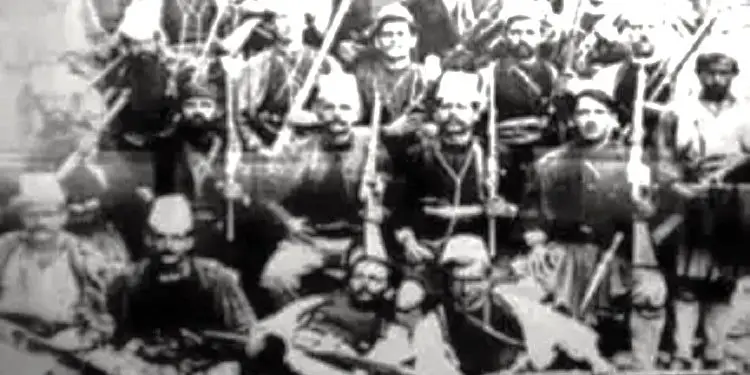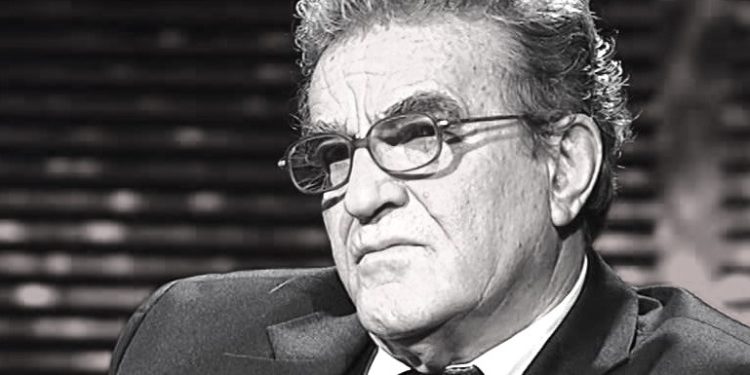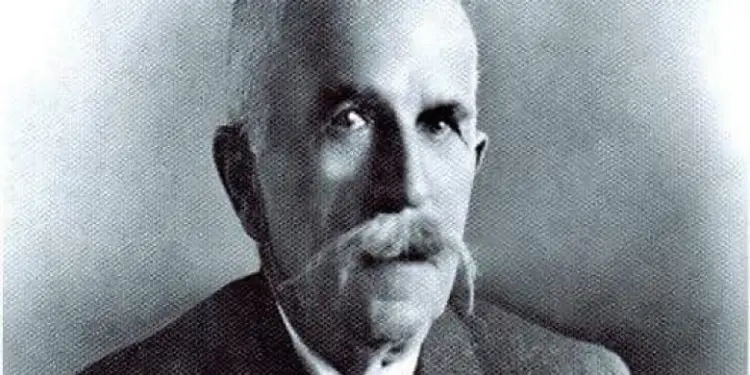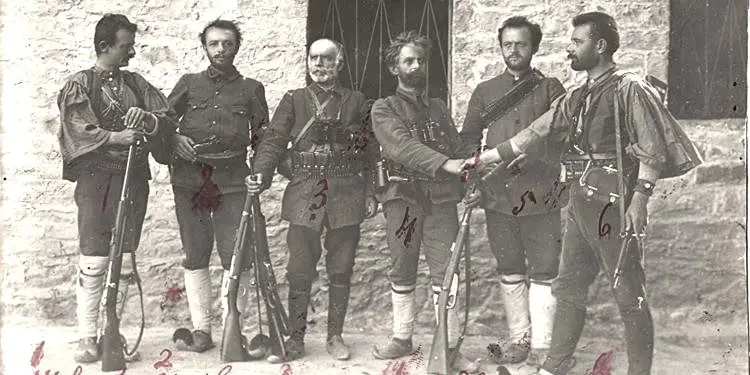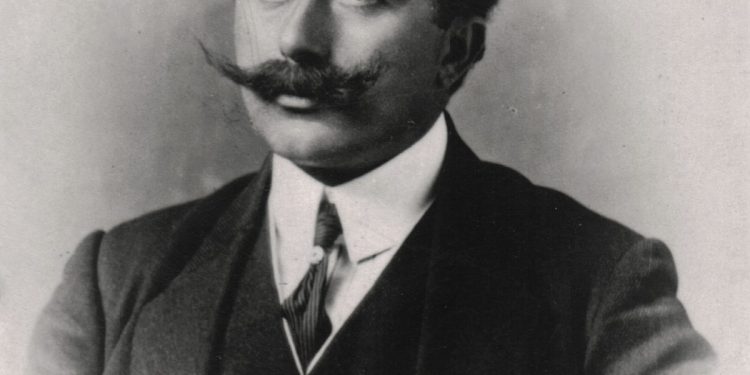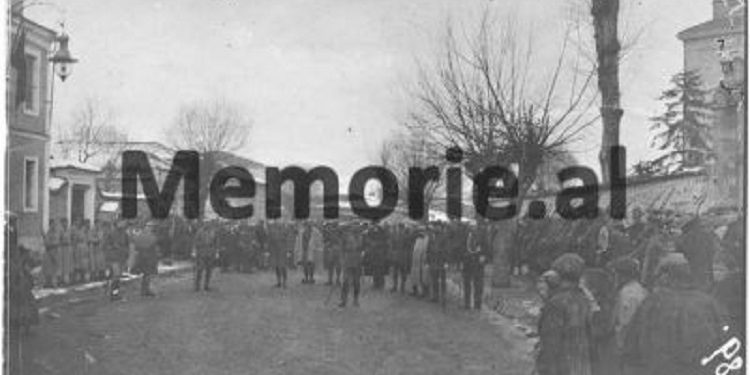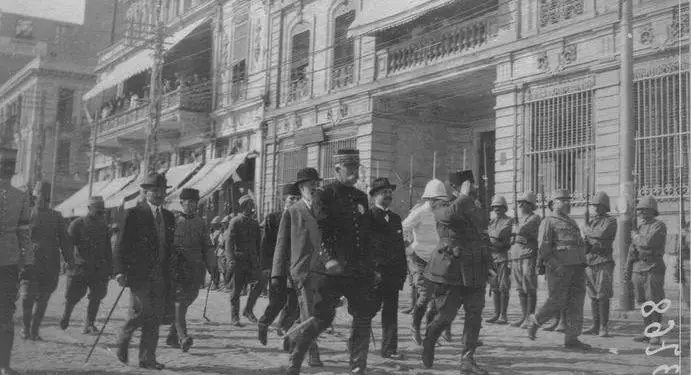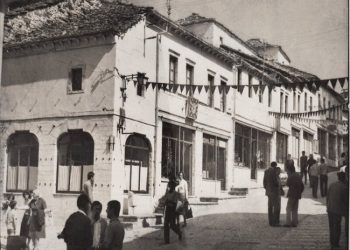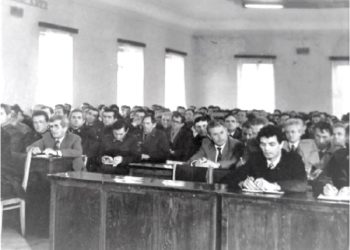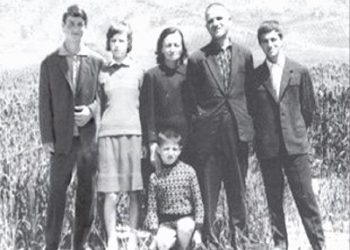By Dr. Uran Butka
Part One
Memorie.al / The declaration of self-government of the Korça region on December 10, 1916, had historical causes, the risk of its annexation by Greece, before, during and after World War I. This is the thesis I want to argue in this article of mine. As is known, during the Balkan War of 1912 and afterwards, the regions of Korça and Gjirokastra were occupied by the Greek army, which established a military regime that, together with the Andartës and criminal gangs brought from Crete and the “holy battalions”, committed genocide against the Albanian population in 1913-14, such as the bloody massacres in the border villages of Kolonja and Leskovik, that of the villages of Kosinja in Përmet, where 75 Albanians were slaughtered, including 27 children, the Panarit massacre of July 10, 1914, where 374 innocent people were massacred, as well as the violent displacement of the population of the regions of Kolonja, Korça, Devolli, Përmet, Skrapar, and Gjirokastra towards the coast, especially in the Vlora region.
The balance of those killed and massacred reached 7,000 people, 192 villages burned, more than 100,000 people forcibly displaced from their homes, of whom 4,000 died of hunger and typhus, in addition to the great material destruction, the burning of houses, the kidnapping of livestock and property. Some of these barbarities were presented by the Albanian Orthodox priest Papa Kosta Tomorri Leusa, in the book “Greek Barbarities in Albania”, published in 1917, precisely in the days of the Albanian Self-Government of Korça.
In addition to the military occupation, a Greek civil regime was also established in Korça, headed by the governor Argyropulos. Greece did not give up the attempt to annex the south of Albania, the so-called “Vorio-Epirus”, in contradiction with the decisions of the London Conference of July 29, 1913 and the Florence Protocol for the definition of the southern borders.
The Great Powers, in a note of January 31, 1914 addressed to the Greek government, demanded the withdrawal of the Greek army from Korça and Gjirokastra, as compensation for the granting of the Aegean islands to Greece. Under international pressure, the Greek government finally agreed to withdraw the armies from the Korça region, completing the evacuation on March 1, 1914. On March 2, Albanian gendarmerie forces led by Dutch officers entered Korça. An Albanian administration was established in Korça, under the subordination of the International Border Commission and a corps of Albanian volunteers under the command of Themistoklis Germanji.
At this time, the Greek political ploy to take the fortress from the inside began. On March 2, 1914, the day Albanian forces entered Korça, the so-called “Autonomy of Northern Epirus” was proclaimed in Gjirokastër by Zografos, former Greek Foreign Minister, who also created a temporary puppet government, which also included former high-ranking officials and Greek bishops. To support Zografos, gangs from the Gulf, as well as local contingents recruited from the Hierolochites, landed in Saranda.
A few days later, Greek army major Spiro Milo, proclaimed the “autonomy of Himara”, which included 7 villages historically inhabited by Albanians. The Greek civil and military authorities, supported by the Greek Church in Korça, activated the Andartes and bandits brought from Greece, who replaced the regular Greek army and organized an uprising inside Korça, combining it with the attack from outside, to show the world that Greece was there and that the population of Korça wanted unification with Greece.
Thus, the coup of April 2, 1914 was organized. The scenario was this: an uprising by Greek soldiers, dressed as civilians as well as Andartes, hidden in the Metropolis, in the hospital as sick, in houses and elsewhere, and by local hierolohites (Greek elements). The Greek Bishop Germanos, rang the bells of the rite, and also notified the Greek army to intervene to “save” the brothers in Korça, so a combination of the coup from within, with military intervention from without. The armed coup plotters emerged at midnight from the places where they had been hiding, and the Andarts who had been stationed in Devoll came to them and together they occupied public buildings, as well as the entrances to the city.
The fiercest fighting took place in the prefecture. The Albanian gendarmerie forces commanded by the Dutch officer G. Sneller, the “Volunteer Corps” of Korça, commanded by Themistokles Germenji and the volunteer forces of Kajo Babjen from Gora, as well as the battalion of Kolonja, commanded by Gani Butka, together with the American captain Spencer, crushed the insurgents after four days of fighting and arrested Bishop Germanos and other leaders of the coup, who were sent to Elbasan.
Professor Simonard, in the book “The Trial of Albanian Independence”, noted: “The events that will follow and that are the result of these tricks and those we have mentioned before, should in fact be considered as false uprisings, not rooted in deep popular feeling: but the Greeks knew how to spin the version of spontaneous resistance so well that the problem was turned upside down”!
Meanwhile, the regular Greek army had crossed the border from the Leskovik side and was headed for Korça. The first bloody attempt was made at Qafë e Badr. There, Qani Ypi fought bravely, with a group of colonists. Everyone was killed, along with commander Qani Ypi. Then Sali Butka gave the order. 350 volunteers were gathered. He was joined by the fighters of Devoll, led by Hasan Bitinckë, as well as the fighters of Pogradec, led by Jashar bey Starova and the chetars of Shaban Blloshmi. The fighters of the Struga Tabor, led by Demir Ali, also came to his aid.
The additional chetas of Sali Butka, fought in Qafë e Qarrit, in Shtika and in Butka, on 19, 20 and 21 April 1914, preventing the Greek soldiers from reaching Korça. Here is what the newspaper “Koha” wrote on May 3, 1914: “In the wars of Shtika and Butka, on April 19, 20 and 21, when the Greeks made the greatest attacks, to break the left wing of the Albanian army, Captain Saliu with his son, Ganina and his comrades, opposed the enemy so manfully and fought with such skill and bravery, that the enemy bowed his head before the Albanian weapons, left the places he had occupied, was broken and disoriented, leaving more than 150 killed on the battlefield.”
But the biggest battle took place in Nikolica, between Kolonja and Devoll. Sali Buka took the front line Qafë e Kazanit- Arrëz- Nikolicë- The Greek army, supported by the Andartët, attacked this time with 2000 soldiers equipped with artillery, under the command of Captain Vardhës, to conquer Korça. The Greeks were defeated and thrown across the border. In this battle, more than 200 Greek soldiers were killed, as well as many Albanian fighters, including the Ladorishtër Bajram Coma and Demisha Hoxha, from Tabor i Struga, who still have their graves in Nikolicë, and Hasan Bitincka was captured, who was interned in a concentration camp in the outskirts of Thessaloniki. During the war, Sali Butka was wounded in the left eye, which ruined his sight for life.
The newspaper “Koha” wrote: “In the battle of Nikolica, on April 24, where the Greeks with 2000 soldiers had set fire to the rifle, Captain Saliu with his brave men, attacked the enemy’s flank and fought with such bravery that he was badly defeated and, disoriented and divided, was withdrawn 6 hours later, leaving more than 200 killed on the battlefield. In this battle that has gone down in history, Sali Butka was also wounded in the left eye, who after the war told the fighters: ‘Do not despair, brothers, because not even with one eye will any enemy of Albania save me’”.
On April 24, 1914, the Great Powers informed Venizelos that they were ready to make concessions to the “Northern Epirotes” and that they could accept the revision of the Greek-Albanian border, in favor of Greece. Under pressure from all sides, the Albanian government of Vid was forced on May 5 to entrust the resolution of the Albanian-Greek conflict to the International Boundary Commission. Negotiations between the KNK and the “Northern Epirote” representatives were held in Corfu and ended with the signing of the “Corfu Protocol”.
This protocol stipulated that the two prefectures in southern Albania, those of Korça and Gjirokastra, although formally part of the Albanian state, would have a separate, autonomous administration, the organization of which was left to the International Control Council. Also, Spiro Milos’ request to recognize the autonomy of the province of Himara, in an area that extended to 14 villages on the Ionian coast. The Corfu Protocol was completely contrary to the Organic Statute of Albania and openly violated the sovereignty of the Albanian state.
Meanwhile, the “Haxhiqamilist” rebellion began in May 1914, which brought internal war and anarchy. The departure of Prince Vidi from Albania on September 3, 1914 and the beginning of World War I turned Albania into a battlefield for the Balkan and European powers. The Greek government took advantage of this situation to penetrate its army into Albania and by the end of 1914, Korça and Gjirokastra were occupied by it. The Serbian armies reached Durrës. Meanwhile, Northern and Central Albania had been occupied by the Austrians, who, after defeating the Serbs, had advanced to the vicinity of Korça.
The Italians had taken a position in the Gjirokastra district and in part of Kolonja, as well as on the island of Sazan and in Vlora. The Entente powers, in order to attract Greece to their side, promised Venizelos sovereignty over Southern Albania, in exchange for its immediate participation in the world conflict. Greece’s chauvinistic appetites increased and it demanded, no longer the autonomy of “Northern Epirus”, but the annexation of southern Albania. These appetites and demands were expressed in the secret Treaty of London of 1915.
While the First World War continued on the Western and Eastern Fronts, the Allies opened the Balkan Front under the command of General Sarrej, based in Thessaloniki. In October 1916, the 1st Light Cavalry Regiment of Africa, commanded by Lieutenant Colonel de Burnazel, militarily occupied the Korça district.
When the French army deployed in this province, it was faced with a large armed Albanian movement, which was fighting to expel the Greek invaders from the province, whose annexationist intentions were known. The patriotic forces of the Korça district reacted and surrounded the city: the brigades of Sali Butka, who collaborated with the Austrians, from Kamenicë to the Tekke of Melçan and the forces of Themistokli Germenji, with Bulgarian-Macedonian support, from Podgoria to Melçan. The two commanders made an agreement to militarily tighten Korça. The Tekke of Melçan with Baba Zylfon, would be a common center.
With the arrival of the French forces, they removed the Constantinian Greeks, as opponents of the Entente, and their place was taken by the Venizelists, who hurried to Korça from Thessaloniki, where Venizelo had set up a government, under the protection of the military powers of the Entente. The Albanian national forces used the strategy of agreement with the French, through Themistokli, but also of military tightening, through the forces of Sali Butka, who sent the following requests to the military authority in Korça, Colonel Burnazel:
1) To raise the Albanian flag in Korça. 2) To open Albanian national schools in Korça and to close Greek schools. 3) The French army to leave the city of Korça and stay in Debojë, at the barracks. In these unfavorable strategic and military circumstances for the French, General Sarrej sent Colonel Dekuan to Korça, with two infantry battalions and cavalry squadrons as well as an artillery battery, with clear instructions: “The General does not want in Korça, neither Greeks of any kind, nor Italians, nor Esatists”!
On November 23, 1916, the colonel removed the Greek governor Argyropolos from Korça, with all his entourage, and dispersed the gangs of Andartë. Dekuan appreciated the Albanian national feeling in Korça, which according to him “the Greek occupation could not let it breathe, but could not suffocate it”.
On November 24, Themistocles presented himself to the French authorities and met with Colonel Decuan. Themistocles Germenji’s words are famous: “I am an Albanian patriot. I have no cause for hostility against the French. I have never been against you, but with those who seemed to me to guarantee the freedom of my homeland. I see the Greeks as our greatest enemies. I have taken up arms to fight them.
Now that the French authorities have removed the representative of the Greek government from Korça, I have no reason to remain in the mountains. I come to you, therefore, as a completely loyal man, Kimen, at your disposal. I ask for nothing more than to help you and to put my influence on the people at your service”.
Even from these patriotic words of Themistocles, it is clear that the main danger for the Korça region was the Greek one. On November 25, 1916, Themistocles addressed the people of Korça with an appeal: “The commander and governor of France in Korça recognize Korça as part of Albania and all the rights of the Albanian nation and pledged to reach an agreement with the Albanians for the governance and security of this country”.
The people factor, that is, the patriotic and civic factor of Korça, was decisive directly, but also through its representatives, such as Petro Harizi, who testifies: “The people hold a meeting in the Casino, where a large majority of the people decide to accept Sali Butka’s conditions: that is, to raise the Albanian flag and open Albanian schools”.
This This is confirmed not only by the findings, but also by the documents brought by the doctor of legal sciences in France, N. Kotta, who has thoroughly studied French documents: “Likewise, the abandoned population of Korça addressed the French commander, to whom they expressed their desire to be free and asked that the province of Korça, separated as a result of the war from the rest of Albania, be declared an autonomous Albanian republic, under French protection, awaiting its unification with Albania”.
Colonel Dequan thus assessed the Albanian patriotic forces: “In the west of Korça, the Austro-Albanian gangs of Sali Butka. The entirety of Sali Butka’s gangs had the strength of several French battalions. In the north of Korça, the Bulgarian-Albanian gangs of Themistocles had the numerical strength of a French battalion. Surrounded by Albanian combat forces, the French colonel made a breakthrough to contact the Albanian commanders”.
“The dean sent a commission of citizens of Korça to Sali Butka, so that he would apologize and come to an agreement with the French, and leave the Korça region,” writes the historian of the self-governing Korça Province, Petro Harizi.
“The French military authorities, seeing the great opposition that was made by the Albanian people of Korça, against the hostile behavior of the Venizellists, seeing also the protests that were made by the Albanians abroad, understanding that the entire people of Korça wanted a complete change of government with an Albanian self-government and with the official language of the country, seeing that the rest of Albania occupied by the enemies of the Entente was also self-governing by Albanians, under the Austrians and Bulgarians, were moved and expressed the desire to come to an agreement with the Albanians.”
Colonel Dekuan sent a military delegation to Sali Butka, headed by Major Masjet, along with a delegation of Korça citizens. The negotiations were successful.
Sali Butka’s requests, dated December 3, 1916:
- The self-government of the kaza of Korça will provisionally include Bilisht, Kolonjë, Opar and Gora, until the other provinces are liberated.
- The official flag will be the flag of Skanderbeg with the two-headed eagle.
- The official language will be Albanian.
- A commission of five patriots will be formed, elected by fighters of the national movement. The commission will fulfill the duties of a government with the right to make laws, appoint and dismiss officials, change and regulate everything it sees as useful and reasonable.
- The administration will be composed of proven patriotic elements.
- The courts will operate in the Albanian language and with personnel capable of fulfilling their duties.
- Education will be entirely Albanian, with sound national foundations.
- All Greek propaganda schools will be closed.
- Posts and telegraphs will depend on the Albanian administration.
- A police force should be formed to maintain the peace of the city.
- An Albanian gendarmerie with Albanian commanders should be formed to protect the country.
- The French command is obliged to protect the self-government of the Korça kaza from any threat.
- The French government assumes the moral obligation to support the rights of Albania and especially of the Korça kaza in the conference that will be convened when the war is over.
Colonel Dekon, in his book “Six Months of History of Albania”, accepts Sali Butka’s proposals and the shocking turn that his proposals took in the direction of declaring the Albanian Self-Government of Korça.
“With the exception of a few agitators, no one in Korça wanted the return of the Greek regime. Everyone wanted not only to maintain the status quo, but also to develop it in the Albanian nationalist direction. This evolution could have taken place gradually, if a personal influence of Sali Butka, who from the Tekke of Melçan observed and felt the aspirations of his compatriots, had not come and caused the accelerated flow of events.
On the evening of December 3, I received a letter from him, in which he declared to me that he was completely willing to lay down his arms, if the command proclaimed the independence of the Kaza of Korça, under the military protection of France. It goes without saying that I was not competent to make the decision that Sali Butka wanted, but it was my duty to study the issue as fully as possible, and to give the Commander-in-Chief all the elements of the decision that would “Take it in this middle.”
Colonel Dekuan examined Sali Butka’s requests from a military point of view, that is, he considered the consequences that accepting or rejecting Sali Butka’s proposals would have on the operations of the Allied armies in the East. He addressed the matter, along with his reasoning, to Commander-in-Chief Sarrej in Thessaloniki and received from him a positive response, which approved Dekuan’s views. He immediately called Themistocles and conveyed the two telegrams from Thessaloniki.
The colonel gives a high and touching assessment of Themistocles: “His satisfaction was of the deepest. Indeed, he saw his dream, the independence of his country, realized, and he would be the main forge of this historical event”! Memorie.al
To be continued in the next issue




